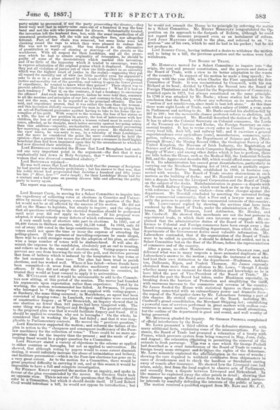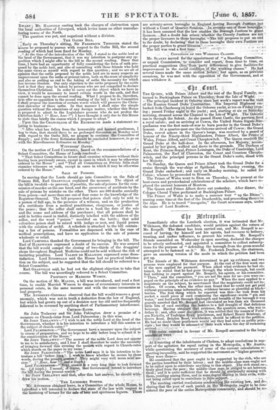THE BOARD or TRADE.
Mr. HORSFALL moved for a Select Committee to inquire into "the origin the past and present constitution, and the powers and duties of the
origin, of Trade, with a view to its better adaptation to the wants
of the country." In support of his motion he made a long speech ; beginning with the year 1636, when Charles the First appointed the first Committee of Trade. It was reconstituted by Cromwell, with his son Richard at its head ; divided by Charles the Second into the Board of Foreign Plantations and the Board for the Superintendence of Commerce ; reunited again in 1672, but always constituted on the same principle. In 1780 it was attacked by Mr. Burke ; whose studies led him to tho conclusion that the Board, without any reflection on its members, was "useless if not mischievous, since trade is best left alone." At this time there wore eight Lords of Trade, each with a salary of 1000/. a year, seats in Parliament and nothing to do. Mr. Burke carried his abolition-bill by 207 to 199; but the mercantile classes preferred reform to abolition, end the Board was retained. Mr. Horsfall described the duties of the board. It has to advise the Colonial Secretary on Colonial commerce, the Lords of the Treasury on Customs and Excise, the Foreign Secretary on commercial treaties. It has to revise every order in Council. It reports on every local bill, dock bill, 'and railway bill ; and it exercises a general superintendence over agriculture (corn), manufactures, commerce, navigation, railways, statistics, the Department of Science and Art, (Marlborough House,) the Mining Record Office, the Geological Survey of the United Kingdom, the Museum of Irish Industiy, the Registration of Science and of Design, Joint-stock Companies Registration, Metropolitan Supply of Water ; and among other duties which it has to perform, there are bills before the House, such as the Medical Bill, the Industrial Schools Bile and the Aggravated Assaults Bill, which would afford some occupation for it. Its administration has caused groat dissatisfaction, particularly in carrying out the Merchant Shipping Act of 1864, and in partially superseding the local Marine Boards, established in 1850, in business connected with wrecks. The Board of Trade creates obstructions in such matters as the building of docks ; and Mr. Horefall went at great length into a dispute between the Liverpool Corporation and the Board of Trade on the subject of the docks. Maladministration in guano—a dispute with the Norfolk Railway Company, which went back as far as the year 1849, with reference to the Torkeey viaduct—form other charges against the department. Mr. Ihnefall concluded by asserting the universal feeling of the commercial community, that a Peer and a lawyer were not exactly the persons to preside over the commercial interests of this country. Mr. Lemorcitzue replied by showing the services that have been rendered by the Board of Trade, under the administration of Mr. Huekisson' Mr. Poulott Thomson, Lord Ashburton, Mr. Henley, and Mr. Cardwell. He showed that merchants are not the best persons to superintend trade' in which their own interests are engaged. He ex. I plained that the administrative duties of the Board of Trade with reference to Colonial and Foreign commerce have been swept away ; the Board remaining as a great consulting department., from which the other departments of the Government derive most valuable information. Mr. Labouchore contended, that if the organization of the Board of Trade were to be called in question, it should be debated and settled, not in it Select Committee but on the floor of the lIouseo before the representatives of commerce and of the country. After a pause, no other Member rising, Sir JAMES GRAHAM rose, and delivered what was in many 'respects a more animated duplicate of Mr. Labouchere's answer to the motion ; reciting the instances of men who had lent their own distinction to the department—Huskisson, Ashburton, Dalhousie, Ripon, and Poulett Thomson. Sir James expressly abstained from more than an allusion to Mr. Lowe, "though Ieloubt whether many men as eminent for their abilities and knowledge as he is have filled the post of Vice-President of the Board of Trade." He described the part the Board had taken, under Huskisson especially., in breaking down the barriers of Protection and simplifying the tariff, with enormous increase to the commerce and revenue of the country. Sir James flooded the House with statistical figures on these points,— launching sums-total with an extraordinary power and dramatic force ; the repeal of the Navigation -laws by Mr. Labouchere forming a part of this chapter. He recited other services of the Board, including Mr. Cardwell's grand consolidation, the Merchant Shipping Act ; establishing a powerful case of services performed in great matters with endless convenience in minor matters. Experience may suggest small alterations, but the outline of the department is good and sound, and well worthy of being preserved. Mr. BENTINCK pleaded for inquiry. Sir GEORGE PEOFIFatA. complained of official interference by the Board. Mr. LOWE presented a third edition of the defensive statement with many additional facts, explaining some of the misconceptions. For instance, the Board of Trade had procured a relaxation of a treaty with France, which prevents oysters from being removed in May, June, July, and August ; the rela.xatioe ‘ce_ettesting in permitting the removal of the animals to fresh pasturage. ...ewes a case which Sir George Pechell had described as a cruel interference of the Board of Trade to render a foreign treaty more stringent anttlitere the rights of the fishermen. Mr. Lowe minutely explained the. efienStreitien in the ease of wrecks ; showing the care required to withhold certilicates from shipmasters in cases of drunkenness and to check the heedless or fraudulent casting away of vessels after insurance. He showed how the Liverpool ease had arisen, solely, first from the local neglect to observe acts of Parliament, and secondly from a dispute between Liverpool and Birkenhead. In like manner he explained away the other points in detail ; showing that these charges against the Board arose from its having offeneed particular interests by manfully defending the interests of the public at large.
The motion received a qualifiee support from Mr. Bass and Mr. J. C.
EWA.RT • Mr. Hamm") casting back the charges of obstruction upon the local authorities of Liverpool, which levies taxes on other manufacturing towns of the North.
The question was put, and negatived without a division.



























 Previous page
Previous page